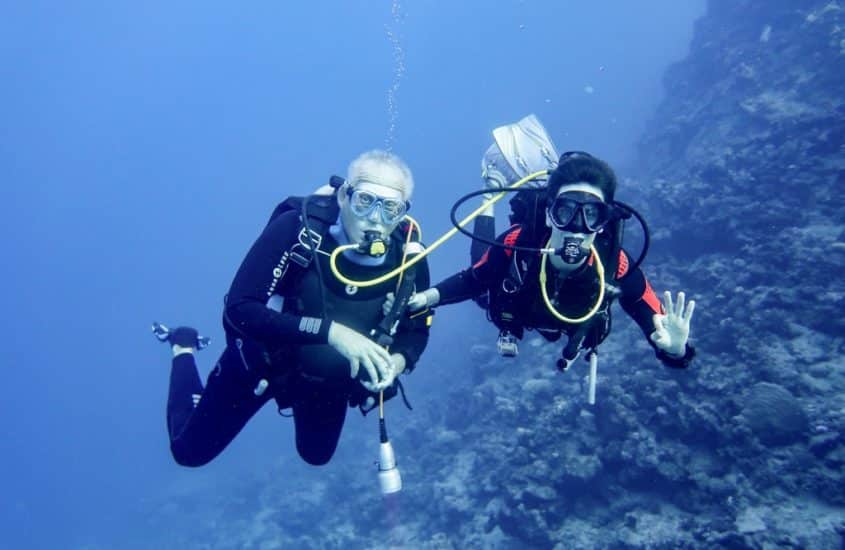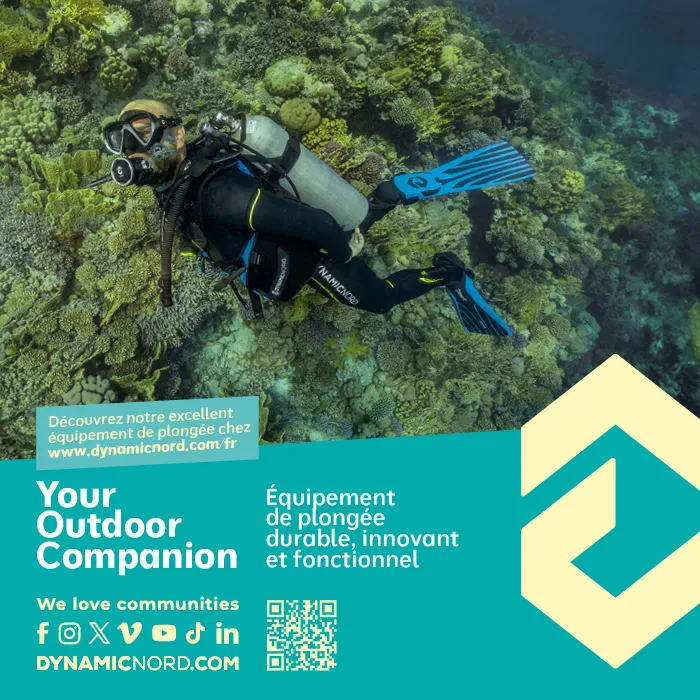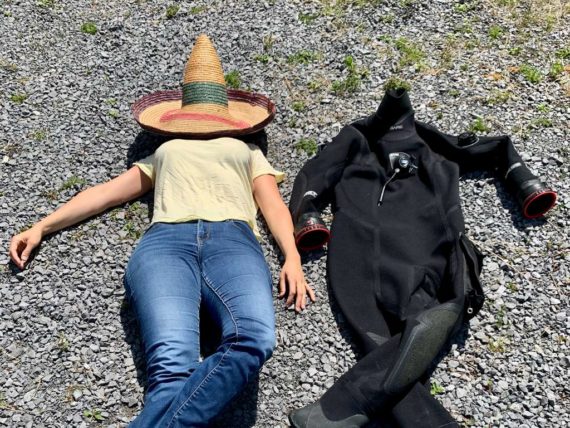Running out of air while diving: Why It’s Scary.. And How To Prevent It

Running out of air while diving
In a perfect world, there should never again be running out of air while diving.
Obviously, underwater, we are not in our natural element. The time we can spend admiring the seabed depends on our gas reserve.
Although we can use good practices to decrease our consumption, we will need to ascend safely at some point. That’s why running out of air is frightening.
For a long time, I wondered how people could seriously have this type of incident while diving. To me, running out of air seemed, frankly, a bit “archaic”.
It dated back to a time when estimating one’s consumption and air supply was much more unpredictable.
And yet…
Unmaintained equipment? Faulty gauge? Poor planning? Distraction? What causes air outages to still exist in our activity, even though they shouldn’t?
Running out of air while diving: three situations that should not have happened
Michelle
The azure blue of the Red Sea contrasts with the sky where the sun sparkles in this May month. Michelle and her dive buddies are preparing for one last dive. Indeed, it’s the end of their stay in Egypt.
Arriving at the entry point, Michelle takes a tank and rigs it. When she tries to open the dive bottle, she can’t.
She calls Ahmed, the equipment manager, who comes, turns the valve a quarter turn, and says, “yes, yes, it was already open, just a bit stiff. Now it’s fully open.”
Michelle puts the tank on her back and climbs onto the Zodiac. She inflates her dive vest, breathes twice through her regulator and then her octopus. She checks her gauge: 190 bars. Perfect!
Everything is perfect!
READ | Choose the best BCD
A few hundred meters further, she enters the water with her group. At -15m, Michelle feels difficulty breathing.
She checks that her regulator is set to maximum flow. She continues to descend. At -20m, no more air comes. She sees her gauge indicating 0 bars. It’s the out-of-air situation she always dreaded!
Michelle then ascends slightly and begins breathing again. She knows her gauge is not faulty.
She remembers the difficult valve and the obvious lack of maintenance on the equipment. Michelle keeps her cool.
She signals her buddy to join her, grabs his octopus, and makes him understand that her tank is closed. Underwater, Patrick loosens the stuck valve with a firm gesture. They both perform a very nice last dive.
Main causes
Equipment lacking maintenance and Michelle’s trust in whom she identified as the specialist.
Luc
Luc is excited. Today, he will explore a small wreck. On the boat, the dive director warns that there might be currents. Luc will dive with a dive guide.
So much the better. He’s only done about fifty dives. Moreover, he started diving late in life. So, he feels reassured to be accompanied.
He checks his equipment, listens attentively to the briefing, and tells his guide he is happy: “It’s my first wreck!”
READ | Bonaire: diver paradise
Underwater, the current is present very quickly. Luc feels breathless trying to follow this young guide against the current. Yes, but the wreck awaits there.
So, he swims until he sees his gauge drop below 100 bars. He informs the guide, who gives him the OK sign and continues on. 80, 70, 60 bars… and still no wreck.
Luc feels anxiety growing. Clearly, he fears running out of air while diving. Especially since they are at -30 meters.
The wreck appears, but he doesn’t look at it; his gauge indicates reserve.
He makes the regulatory sign to the guide, who responds OK and starts ascending in open water. Luc is stressed. The breathlessness coupled with anxiety makes him empty his tank faster than expected.
The needle reaches zero when he arrives at the safety stop.
Suddenly, breathing becomes difficult. In three breaths, he has no air left and no longer trusts his guide.
So, he ascends without waiting, free diving, and finds himself on the surface with a computer telling him to descend again. The guide joins him and scolds him.
Outraged, Luc stays silent. He returns for 3 minutes to -5m on the guide’s octopus and decides, above all, to have a frank discussion with the center’s manager.
Main causes
A dive unsuitable for Luc’s physical condition, level, and age. Too much confidence on the part of the guide. Insufficient communication. Poor stress management. Lack of consideration for Luc’s actual air consumption.
READ | Divemaster, 4* Diver, Palanquée Guide, Level 4… How to find your way around?
Richard
Somewhere in a cold water body, three years ago. Richard and his buddy are about to perform a “photo test” dive starting from the shore.
Richard has a brand-new camera. Both divers are very experienced and have completed hundreds of dives, including several together.
Out of safety concerns, they wear dry suits and carry fully redundant equipment.
They’re happy to be together. The weather is mild.
After the usual checks and a detailed briefing, they enter the water and start their dive. 30 minutes later, they return to -20 meters.
READ | How to succeed in your dive briefing?
Suddenly, it’s an out-of-air situation. Very quickly, Richard feels himself sinking and is unable to inflate his vest or dry suit.
Since he is equipped with a twin tank setup, he knows it’s pointless to try his second air source since the tanks are interconnected. So, he panics and tries to reach Julien, his buddy.
But his camera is cumbersome. By the time his buddy realizes the distress, Richard has already inhaled water.
Julien places the regulator in his friend’s mouth, who loses consciousness, and ascends as quickly as he can. He knows he’s close to shore, so he’s confident.
Unfortunately, once on the surface, Richard is in cardiac arrest. He won’t come back despite the rapid intervention by the surface safety team present on the shore.
Upon equipment inspection, it appears that the manifold valve was closed. And the second tank of his twin setup was therefore full.
Richard, distracted by his new camera, had probably forgotten to check this valve, despite the dive check performed.
Main causes
Poor dive check. New equipment. Distance from buddy. Panic.
Stories of running out of air while diving are unfortunately more common than one might think. While it may not be feasible to completely eliminate them, it is possible to reduce and manage them as best as possible.
Causes of running out of air while diving
There are multiple causes of running out of air while diving.
- Hazardous planning: not diving as decided, or nothing is planned at the surface. One advice: dive what you have planned and nothing else!
- Distraction: captivated by the beauty of the underwater world, by the photos taken… one forgets to monitor their air supply.
- Poor routing: inappropriate route, a guide who insists on finding his way…
- Boredom during the dive: helping someone in trouble, reattaching a poorly strapped tank with difficulty
- Panic or breathlessness
- Lack of communication or ineffective communication
- Weather conditions: strong currents, cold currents Losing your group or being too far from your dive buddies
- Unmaintained or faulty equipment: all autonomous divers are responsible for the proper functioning of their equipment, even if it’s rented.
- Do not accept diving with a faulty gauge.
- Be aware: sometimes you might think your gauge is working, but the needle does not drop below 50 bars, for example.
- Be vigilant about your gauge’s behavior.
- Unsuitable equipment: overly heavy weighting, insufficient thermal protection…
- New equipment that one is not familiar with
- Closed or improperly opened tank
Prevention
Prevention, coupled with planning, is often a guarantee of a dive’s smooth progression and can help avoid out-of-air situations. There are different ways to achieve this.
- Check the pressure of your tank under good conditions (not just after filling or if the tank has been in direct sunlight)
- Have an octopus or second air source clearly identified during the briefing
- Use a well-maintained, familiar equipment Ideally: dual-valve tanks and two regulators for everyone. Or twin tanks.
- Review signs during the pre-dive check
- Regularly glance at your gauge.
- Test your secondary air source at every water entry
- During the dive: stay close to your buddies, limit depth, adapt to the buddy with the smallest gas reserve…
- Perform side mount diving because you have 2 separate tanks 😉
Training: The Exercise and the Out of Air Signal
Although it should no longer occur, running out of air while diving still sometimes happens. Therefore, you must learn the essential gestures during your training. First, in a protected environment at shallow depth, then in a natural setting.
- Recognize/make the out-of-air signal: your hand horizontally moves back and forth in front of your throat
- Present/take an air source to your buddy
- Ascend together It’s quite simple.
- With a bit of calm, everything will go exactly as it should.
- Don’t hesitate to periodically repeat this out-of-air exercise with your buddies.
- This way, it will remain an automatism for you.
Reacting
If, despite all your precautions, your buddy or you run out of air while diving, react calmly. Perform the gestures you have learned during your dive training.
- Grab your buddy (by the vest strap, for example)
- Present them with an air source (first or second, depending on what you have determined in the briefing). More and more divers tell their buddy to come and take their primary air source.
- They have a secondary source around their neck.
- Allow your buddy a moment to calm down.
- Reassure them with eye contact and maintain visual contact if they are anxious.
- Continue holding them (arm in arm or by the vest strap).
- Ascend to the surface calmly, heading towards the exit (boat or entry point) if possible.
- Perform the required safety stops (no need to risk further accidents).
Why You Shouldn’t Hold Your Breath While Diving?
You should not hold your breath while diving, but in case of running out of air, you will inevitably be tempted to do so.
Beware of the risk of pulmonary overpressure.
Indeed, when you breathe compressed air underwater, the pressure of the air in your lungs varies with depth.
If you hold your breath and ascend, even by a few meters, the air in your lungs expands but cannot escape. This can lead to pulmonary overpressure.
The best thing to do to avoid running out of air while diving and the problems that can result from it is to plan your dive well and pay attention to your gas reserve throughout the immersion.
Running out of air while diving : Conclusion
Today, modern equipment is reliable and efficient if well maintained.
Pressure transmitters coupled to a computer can provide precise information on how much longer it is possible to stay at the current depth and surface with the planned gas supply at the end of the dive.
Procedures are regularly reviewed and adapted.
Thus, it can be said that running out of air while diving is now primarily due to human error: distraction, anxiety, losing your group, lack of habit… or negligence regarding one’s equipment.
Running out of air while diving should no longer exist.
But here we are, human. And therefore, perfectly imperfect.
So, we have to implement good practices in terms of prevention and reaction. And also, to be vigilant towards ourselves and others.
For dives with pleasure and in complete safety.
Out of Air in Diving, What Are Your Experiences?
Tell me about it in a comment below to benefit as many as possible.
And most importantly… don’t forget to be happy
Helen
You also want answers to these questions:
How to know if you are experiencing decompression sickness?
Decompression sickness can manifest as symptoms such as joint pain, fatigue, dizziness, or breathing difficulties shortly after a dive.
Rapid recognition of these signs is crucial for immediate and effective treatment. In doubt, anything unusual after a dive should be considered suspicious.
Why shouldn’t you fly after diving?
Flying too soon after diving increases the risk of decompression sickness because the decrease in pressure at altitude can cause bubbles to form.
DAN advises waiting at least 24 hours after a dive to allow for the elimination of absorbed nitrogen.
What are the signs of a diving accident in a conscious victim?
A conscious victim of a diving accident may show symptoms such as dizziness, nausea, joint or muscle pain, and breathing difficulties. It’s also possible to observe signs of confusion, excessive fatigue, or partial paralysis.
The same signs you might observe in yourself but in another. Hence the importance of closely watching your dive buddies.
Join me on my Instagram Page





